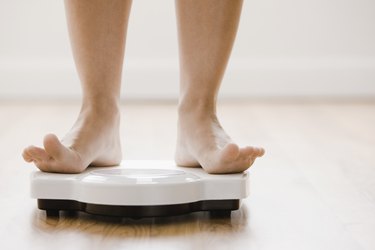
Many medical providers use body mass index, or BMI, to assess your weight and health risk. BMI is a calculation of a person's weight in kilograms divided by the square of his height in meters.
A BMI below 18.5 is considered underweight, 18.5 to 24.9 is healthy, 25 to 29.9 is overweight and 30 or above is obesity. Although BMI can be accurate for a large portion of the population, it often miscategorizes bodybuilders, who have an abundance of muscle, as having overweight or obesity. If you're a bodybuilder or another type of athlete, use alternative methods for evaluating your health.
Video of the Day
Video of the Day
Tip
If you're a bodybuilder, BMI might not provide an accurate assessment of your body composition and disease risk. Although the BMI formula cannot be changed, you can use alternative methods to assess your health.
When BMI Is Useful
For a large portion of the population, BMI does accurately indicate whether someone has overweight or obesity and is at an increased risk of disease. No special changes to the formula are needed for age or gender, so it's simple to measure. For children and teens, BMI is still calculated the same way, but the results are interpreted differently to account for age and gender, as girls naturally acquire more fat as they move into puberty.
Your doctor should be able to determine through a physical examination whether your bodybuilding regimen makes BMI an inaccurate measure for you. The formula for BMI can't be changed, so bodybuilders shouldn't use it as an indicator of obesity.
Read more: What Is a Realistic BMI for Someone Athletic?
Waist Circumference for BMI Estimates
BMI overestimates body fat in bodybuilders and can underestimate fatness in people of normal weight who have little muscle mass, but carry a lot of extra pounds in the midsection. For both of these populations, a measure of waist circumference may be a better indicator of health. A waist that measures larger than 40 inches for men or 35 inches for women could be a sign that you have too much visceral, or intra-abdominal, fat.
This type of fat surrounds the internal organs and is metabolically active, raising your risk of chronic conditions such as heart disease and Type 2 diabetes. If, however, you have a thicker midsection due to developed abdominal and back muscles, you might have a larger-than-expected waist size even if you don't carry a lot of visceral body fat.
Body Composition Percentages
For a bodybuilder, measuring your body composition — or ratio of lean mass to fat mass, or body fat percentage — may be a more accurate measure of health. Lean mass consists of muscle, bone, organ and fluid weight. While no absolute standards for body fat percentages exist, it's generally accepted that most athletic men have a body fat percent ranging from 5 to 13, and 12 to 22 percent for women. Bodybuilders ready for competition usually fall into the lower end of this range. However, if you swing wildly in your weight and definition during the off-season, you could creep into an unhealthy body fat percentage, especially when you're trying to bulk.
For optimal health, a man should have between 10 and 25 percent body fat and a woman between 18 and 30 percent. Women need essential fat of about 8 percent and men of about 5 percent to support critical body functions, including proper hormone production and vitamin absorption. Fat levels for men of above 25 percent and above 30 percent for women indicates obesity and increased risk of disease.
A body fat scale provides a rough estimate of your body fat. For more accurate measures, consult a fitness professional to be measured with body fat calipers or undergo underwater weighing or a DEXA scan in a medical setting.
Read more: BMI Vs. Body Fat Percentage
Medical Assessments as BMI Alternatives
A BMI that indicates you have overweight or obesity helps your doctor determine if you are at increased risk of developing heart disease. When BMI is inaccurate, your family history, whether you smoke and certain blood tests inform your doctor about your potential risk. Your blood cholesterol level and blood sugar levels, as well as your blood pressure, are important health markers for anyone to have tested regularly, including bodybuilders.